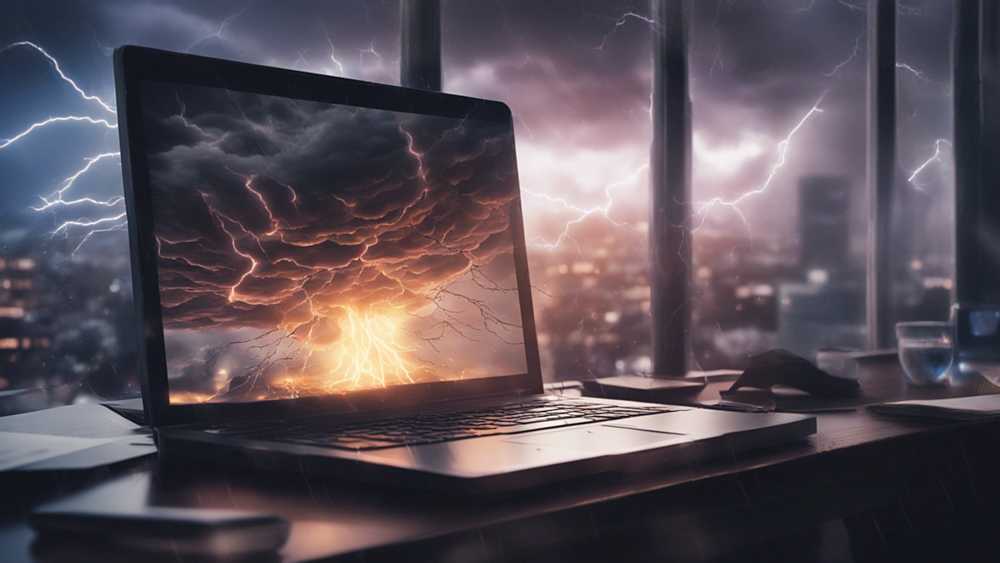by Jerry Stern
Webmaster, PC410.com
There was a power failure here a few months back. 14 hours with no power, and then there were lights outside my window in the dark, and there was a power company truck with cherry picker, a portable lighting truck, and cable truck, all lined up at the power pole, and working in cold rain at 3am. And then the next morning, a fire on same pole took out the other leg of the 240-volt service, just not the 120-volt service I depend on here. I thought I had my communications reasonably well-diversified; now, I still think so, but I made changes, and will consider more.
There was a time when I had no problem turning off the internet, and replying to emails a week later, if that’s when I got back to my desk after a vacation. That was 25 years ago; the world has gotten considerably faster since then. Now, if my business is offline, I can’t monitor websites–can’t really edit them offline because of all the Content-Management Systems (CMS), can’t get to email, can’t get to voicemail, can’t do much at all.
To protect myself from outages, I have backups and redundancies. My business phone is from the local POTS provider–that’s the acronym for ‘plain old telephone service’, but my personal phone line is from the local cable company, where it is half the cost, and just having it results in a discount on my internet service, so the net cost is that it reduces my bill $8 a month to have it. OK, the copper phone line stayed up in the outage; cordless phones failed, but there’s one corded phone on each floor of the house. The personal phone line failed, despite having built-in battery backup and being plugged into an Uninterruptible Power Supply; when the system dies at the pole, there’s nothing to do.
Internet is another matter; when power came back on, the internet and the private phone line stayed down. The cable company was able to reset the phone remotely after I called in on the other land line, but Internet was still down, and they scheduled that repair for four-days out. In typical clueless-cable fashion, they neglected to find the regional outage, which was fixed some 12 hours later, but still, I had no internet, and a promised 4-day outage, on a Monday of what was going to be a very busy week.
Home-Based Business
There are some basic issues that apply to home-based businesses that don’t apply to rented office space. Business-class internet service generally has a 24-hour service guarantee; residential is limited to whatever can be patched with duct tape whenever we get around to you, and don’t bother us. Owners of these businesses can’t work from home on their own connection; we live upstairs or downstairs from the business–there’s no internet backup. We can grab a notebook computer and go to the nearest coffee shop with internet, if we configured the gadget in advance to be safe to use on an open network, using only encrypted connections for both email and webmail, and to have all our most-needed work ready to go. Those aren’t settings that can be copied during a power failure–plan ahead. My notebook, of course, was a few weeks short of current on work files, but it had the right settings.
Off I drove to find the internet, and I found it at a Panera Bread café. I also found the weekend’s spam files. Those are easy to deal with at my desk; I have a fast connection there. But letting Mailwasher Pro analyze 150 emails while sitting in a restaurant running a shared connection isn’t practical. I’m just not doing that again.
What’s Broken?
First, to stay functional, I need to be in my office, with a backup source of internet access at a basic level, with access to all email, at minimum. Café s don’t match how I work.
Next, I can’t be relying on spam filters on a computer to handle the flow of junk that results from using an email address that was on my web pages from 1996 to the turn of the century. Spam filtering at the server has to be effective enough to be the only layer of filtering when I’m working from a slow connection.
Phones are comparatively easy. My business, personal, and cell phones are from three different companies, so they shouldn’t go down simultaneously, and didn’t.
What to Fix?
As my new backup for Internet, I switched my cell phone service from a “feature phone” which can handle some email in a crude and pay-per-message fashion to an Android smart phone with a good data plan. That gives me access to Gmail, plus my email from my web sites, allows web surfing in a light-usage mode, and pretty much reconnects me to the world, but it doesn’t fix the spam problem.
I added a ‘Solar Power Pack‘ cell phone charger to my mobile toolkit. These are usable for any phone that charges from a USB connection. And there’s an auto lighter power cable for the cell phone stored in my car.
Fixing the spam turned out to be easy; I had one problem address with a heavy spam load, and I just set it to forward through Gmail, which cleaned it so well that I didn’t need any filtering software on the notebook, and had no problem reading the clean results on my phone.
Do More?
I’m still considering whether I should have more backup capability. Any of these options would work; each involves additional monthly expenses:
I could add a second home internet connection. There are Cisco routers that can connect to and manage dual WAN connections, or more simply, two Internet accounts (“dual-wan” routers).
I could switch my residential cable internet connection to a business account. It’s not any faster; it’s just around $30 more expensive, but includes a repair-time guarantee of one day.
Getting a tablet computer with a cellular data plan would be another backup; it’s really just a big version of the smart phone, without the phone calls, but it also adds another monthly bill.
The smart phone is working so well for data that I won’t hook up to another monthly bill for internet, for now. And as a programmer, I need that Android phone for App testing. And backup communications. Right, that’s my justification for a phone that has more memory and storage than my first six computers combined. Yeah, right. And it plays Angry Birds.
Jerry Stern was the editor of ASPects from 1997 to 2015, the author of Graphcat and FileTiger, runs Science Translations, and is online at www.sciencetranslations.com.

